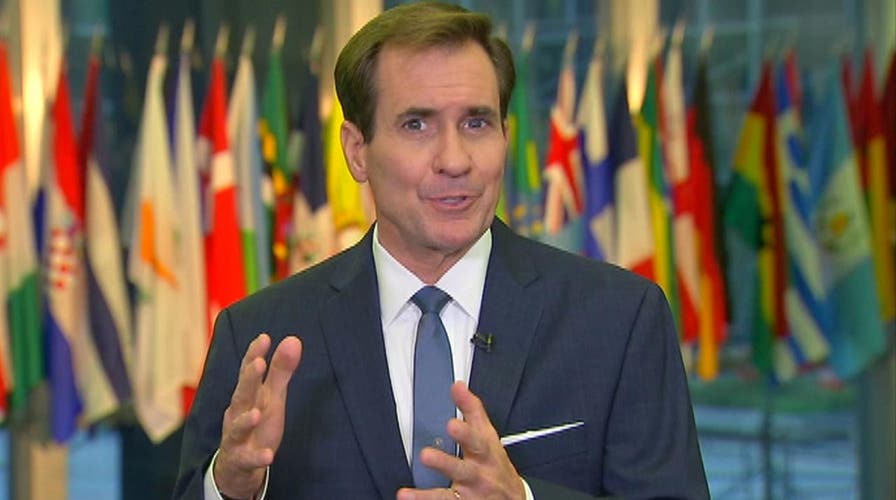State Department defends Keystone pipeline rejection
John Kirby shares justifications for the decision on 'Your World'
This is a rush transcript from "Your World," November 6, 2015. This copy may not be in its final form and may be updated.
NEIL CAVUTO, HOST: All right, it began with the State Department. It was in their purview to decide yea or nay on this Keystone pipeline. And they decided nay. John Kerry said that he had weighed it very thoughtfully, carefully, and this had been something that had been kicked around for the better part of seven years.
John Kirby, the State Department spokesman, with us now on the implications of that.
John, it`s always very good to have you.
You know what a lot of Republicans are saying, bad move, bad timing, and all in the name of climate change, bad justification. What do you say?
JOHN KIRBY, FORMER U.S. DEPUTY ASSISTANT SECRETARY OF DEFENSE: Well, look, we looked at this, as you said, exhaustively for several years.
CAVUTO: What took so long?
(CROSSTALK)
CAVUTO: If it was going to be this, why did it take so long?
KIRBY: Well, the process was lengthy, to be sure, but that`s because it had to include a lot of public involvement and public comments that were -- had to be taken into account.
So it was done thoughtfully, judiciously and, yes, it was done over a period of time. It was really important, I think everybody understand, to get this right, not to get it quick. And the secretary did determine, as you rightly said, that this was not in the national interests.
And climate change and our leadership and ability to be a world leader on climate change was a major factor in his decision.
(CROSSTALK)
CAVUTO: Why are those two irreconcilable, though, John? I mean, I`m going to give at face value that it took seven years to conclude that.
But was there a feeling that you can`t have this type of activity and be for addressing climate change at the same time, even though the alternative to getting this oil shipped around now presents a lot greater environmental risk?
KIRBY: Well, I don`t think we share that assessment, to be honest, Neil.
I mean, we looked at all of the factors here. And the fact is, it didn`t -- the numbers were one factor, obviously. And it didn`t -- it didn`t -- when it -- in the end, that didn`t become a deciding factor, because it didn`t really affect the economy in any measurable way. It wasn`t going to lower gas prices.
And, as you said, transportation, what the secretary was asked to determine was not this method of transportation vs. this. It was his -- he was asked to say, to determine the national interests of this particular pipeline.
So, while I can`t say that this very dirty oil is going to transport through the country through other means, which it might, what we did determine was that the pipeline itself was not in the national interests in terms of...
CAVUTO: But was it in our national security interests? Hearkening back to your days talking about the Pentagon, there are a lot of military types all of types of politics, John, who say, well, I would rather be getting whatever we can energy-wise from this country and exhausting all means in this country, including wind, including solar, but certainly including this.
Robert Murray, of course, the coal industry CEO, says that it`s tantamount to a war on the traditional fossil fuels that have given us this rapid decline in prices and the enviable position that we have now and we`re blowing it away.
KIRBY: I think that`s actually an overblown, overstated argument. Look, we have got to get more clean...
CAVUTO: Well, look how low energy prices are. What prompted that, all of this fracking, all of this alternative stuff, right?
KIRBY: And so gas prices are lower. You`re right.
And we determined through this analysis that this pipeline would have no effect necessarily on those prices, but it would result in the transport through this country of some of the dirtiest oil on the planet, and that that is not in keeping...
CAVUTO: So, all their assurances that they would clean this and all these unions who wanted all these jobs saying that they were fulfilling their environmental responsibilities, were they lying?
KIRBY: Again, our analysis did not show that this was going to have a measurable, tangible effect on jobs or on gas prices here in this country.
What it came down to was the potential for this pipeline to undermine our global leadership with respect to climate change.
CAVUTO: All right. Well, John, I very much appreciate your coming on and to state that case.
KIRBY: Thanks.
CAVUTO: Always good talking to you, John Kirby, spokesman at the State Department.
KIRBY: Thanks.
CAVUTO: All right.
END
Content and Programming Copyright 2015 Fox News Network, LLC. ALL RIGHTS RESERVED. Copyright 2015 CQ-Roll Call, Inc. All materials herein are protected by United States copyright law and may not be reproduced, distributed, transmitted, displayed, published or broadcast without the prior written permission of CQ-Roll Call. You may not alter or remove any trademark, copyright or other notice from copies of the content.

